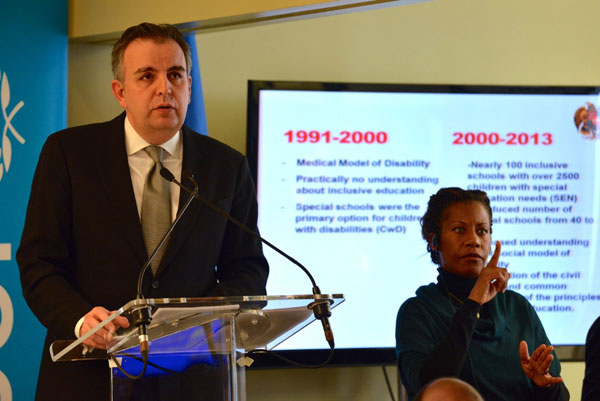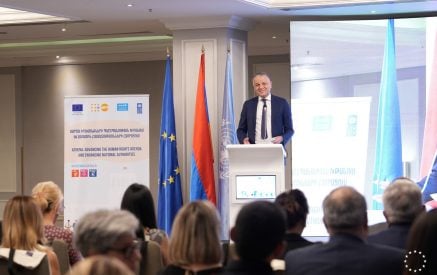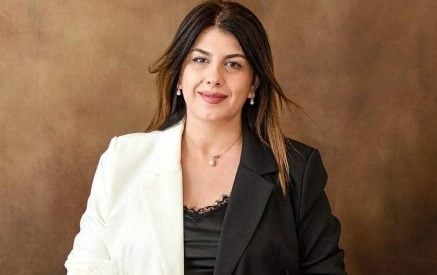Progressive policies in inclusive education have made positive changes in the lives of children with disabilities in Central and Eastern Europe and Central Asia, according to UNICEF today.
More schools are welcoming first grade children with disabilities in Serbia as a result of years of policy advocacy. Huge nationwide awareness raising campaigns in Montenegro and strong engagement of civil society in promoting inclusionin Armenia have led to increased public demands for inclusive schools, UNICEF said.
At a briefingfocusing on the issue of children with disabilities this week during a meeting of UNICEF’s Executive Board in New York, other governments and donor communities were urged to support policies that realized all children`s right to quality education as one way to reduce inequities created by social exclusion.
Countries highlighted their achievements to the President of the UNICEF Executive Board and Permanent Representative of Finland to the United NationsH.E. JarmoViinanen, UNICEF Executive Director Anthony Lake, Regional Director for Central and Eastern Europe and the Commonwealth of Independent States Marie Pierre Poirier, and members of UNICEF Executive Board and permanent missions from the region.
Read also
Mr.Viinanenfocused on the importance of the right to education irrespective of disabilities, colour, sex, language, religion or economic background. “We cannot afford leaving any child outside schools. Every child must have an equal right to basic education,” he said.
He shared some Finnish experiences in education with the audience: ”In Finland basic education is completely free of charge including also school meals and materials, health care and commuting. The aim is that all children including children with disabilities could attend the same schools. The school network is regionally extensive and a lot of emphasis has been given to the quality training of motivated teachers. Qualified teachers are instrumental to successful inclusive education.”
“The examples shown today clearly demonstrate that we know how to make schools welcoming for children with disabilities. But much more needs to be done. Current policies common across many countries mean that children with disabilities are often hidden behind closed doors,” said Ms.Poirier of UNICEF.
“They endure stigma instead of discovering their talents. They are left out of birth registers and become invisible. And even when children with disabilitieshave access to education, they are excluded from regular schools or often segregated in special schools, away from their families and communities,” she said.
The key achievements cited at the briefing included:
- ·Minister of Education, Science and Technological Development from Serbia, Dr.ZarkoObradovicdescribed innovations such as the Network for Inclusive Education where the government and over 50 teachers, school psychologists, pedagogues and the members of national civil society groups work together with the National Monitoring Framework that tracks progress in reducing inequities in education. Some 15,000 teachers, or a fifth of the total, have now been trained. A third of Serbian primary schools increased enrolment of children with disabilities into the first grade in 2010.
- ·The Permanent Representative of Armenia, H.E. GarenNazarian,speaking on behalf of the government focused on the importance of making a strategic shift from grassroots school-level work to a comprehensive policy effort, including the transformation of special schools.
In particular, Mr. Nazarian mentioned that Armenia has made tangible progress in ensuring the rights of children with disabilities, especially in the area of education. Today 1700 children with disabilities are studying in close to 100 inclusive schools and this number will increase with the adoption of amendments to the Law on Education currently being discussed by the National Assembly of Armenia.
Among challenges Mr.Nazarianemphasized highpoverty rates among children with disabilities, lack of comprehensive services as well as stereotypes and discrimination towards persons with disabilities, including children, and their ability to become full-fledged members of the community.
- ·Deputy Minister of Education and Sports from Montenegro,Ms.VesnaVucurovicoutlined a three-year advocacy campaign reaching 80 per cent of the population. One in four people surveyed said they had changed their behaviour and are now more accepting that children with disabilities are included in mainstream schools and society.
UNICEF welcomed greater focus by the donor community on more inclusive assistance programmes, which in the area of inclusive education and children with disabilities was currently being led by the Government of Australia.
The 2011 World Disability Report estimated the number of children with disabilities at 5.1 per cent of the population. This means about 93 million children in the world and about 5.1 million in Central and Eastern Europe and Central Asia. However, these figures only represent very gross estimates and should be treated with caution. In most cases, the underlying national data should be improved in quality and collected using up-to-date definitions and consistent methods to provide a reliable picture.
Children continue to remain invisible whether they are excluded from education, or segregated within the mainstream or make up the more than600,000 children in institutions, which is still a common approach in many countries of the region.
A UNICEF paper The Right of Children with Disabilities to Education:A Rights-Based Approach to Inclusive Educationwas presented at the briefing detailing how inclusive education promotes tolerance and equal participation in society. It leads to better learning outcomes, not only for children with disabilities but for all children. It is central to the achievement of high quality education for all learners, reducing inequities and building more inclusive societies.
All students, including children with disabilities, require individualized services and approaches to learning. Inclusive education does not require special schools, specialized care, expensive materials or highly technical expertise.
UNICEF is working with governments to support families to prevent separation; end placement of children in large-scale institutions; as well as provide quality inclusive education. Inclusive education means each and every child – with or without disability, rich or poor, regardless of gender, ethnic, religious, cultural origins – is able to attend a neighbourhood school, which fully nurtures every child’s potential.
Emil Sahakyan – Communication Officer, UNICEF Armenia





























































